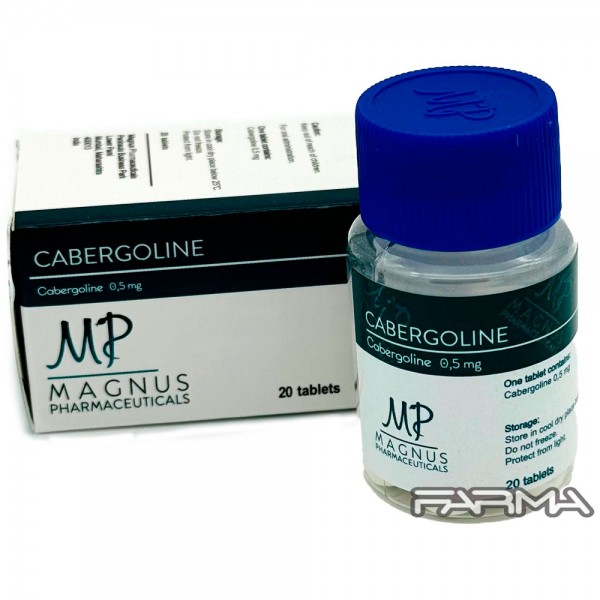Magnus Cabergoline, containing 0.5 mg per tablet, is a pharmaceutical drug primarily used to treat hyperprolactinemia (high levels of prolactin in the blood), which can lead to conditions such as infertility, sexual dysfunction, and bone loss. Cabergoline is a dopamine agonist that works by binding to dopamine receptors in the pituitary gland, thereby inhibiting the production of prolactin.
Advantages:
-
Effective Prolactin Control: Cabergoline is highly effective in reducing prolactin levels, helping to resolve symptoms associated with hyperprolactinemia.
-
Infrequent Dosing Schedule: Due to its long half-life, cabergoline can often be administered just once or twice a week, which is more convenient compared to alternative treatments requiring daily dosing.
-
Improvements in Symptoms: For patients with prolactin-related conditions, reducing prolactin levels can lead to improvements in reproductive health, sexual function, and overall quality of life.
Effects:
-
Restoration of Normal Menstrual Function: In women with hyperprolactinemia, cabergoline can restore normal menstrual cycles and ovulation.
-
Enhanced Libido and Sexual Function: By lowering prolactin levels, cabergoline can improve libido and sexual function in both men and women.
-
Potential Bone Density Improvements: Reducing excessively high prolactin levels can help improve bone density, reducing the risk of osteoporosis.
Dosage and Administration:
-
The typical starting dosage for the treatment of hyperprolactinemia is 0.5 mg per week, given in one or two divided doses (e.g., half a tablet twice per week).
-
Dosage may be gradually increased, usually by adding 0.5 mg per week at monthly intervals, until the desired response is achieved.
-
The dose for other conditions, like adjunctive treatment of Parkinson’s disease or acromegaly, may vary.
Cycle Recommendations:
-
Treatment duration and dosing schedule are highly individualized based on the patient's response and blood prolactin levels.
-
Regular monitoring of prolactin levels is recommended to adjust the dose to the minimum effective amount.
Precautions:
-
Common side effects include nausea, headache, dizziness, and orthostatic hypotension (a drop in blood pressure when standing up).
-
Less commonly, cabergoline can cause more serious effects such as valvular heart disease, especially with long-term use and at higher doses.
-
Patients should be monitored for signs of heart valve dysfunction, and periodic heart monitoring may be recommended in long-term use.
Interactions:
-
Cabergoline may interact with other dopamine antagonists, such as antipsychotics, which can counteract its effects.
-
Because it can lower blood pressure, combining cabergoline with other blood pressure-lowering medications may require adjustment to treatment regimens to avoid hypotension.
Magnus Cabergoline is an effective treatment for reducing high prolactin levels and managing associated conditions. However, it must be used under careful medical supervision to monitor its effects and manage potential side effects, particularly concerning cardiovascular health. Always consult with a healthcare provider before starting treatment with cabergoline to ensure it is safe and appropriate for your specific health needs.
There are no reviews for this product, be the first to leave your review.

No questions about this product, be the first and ask your question.

